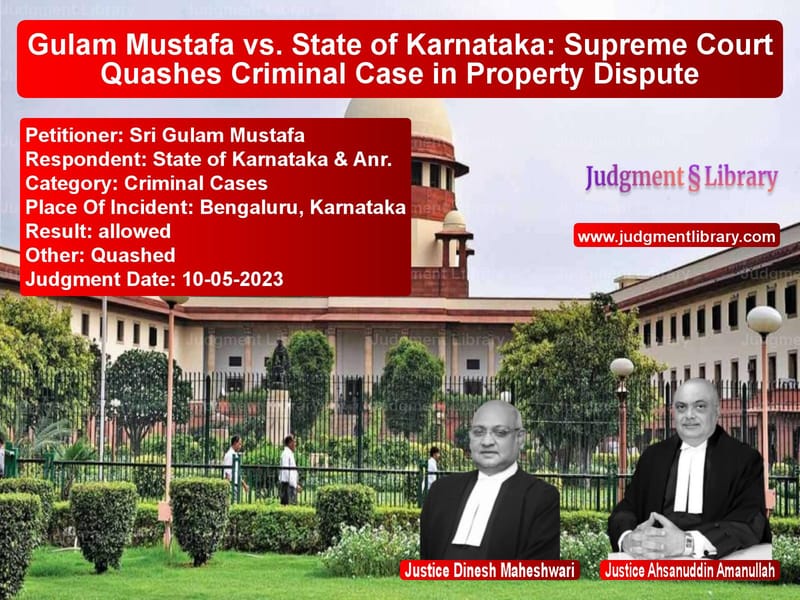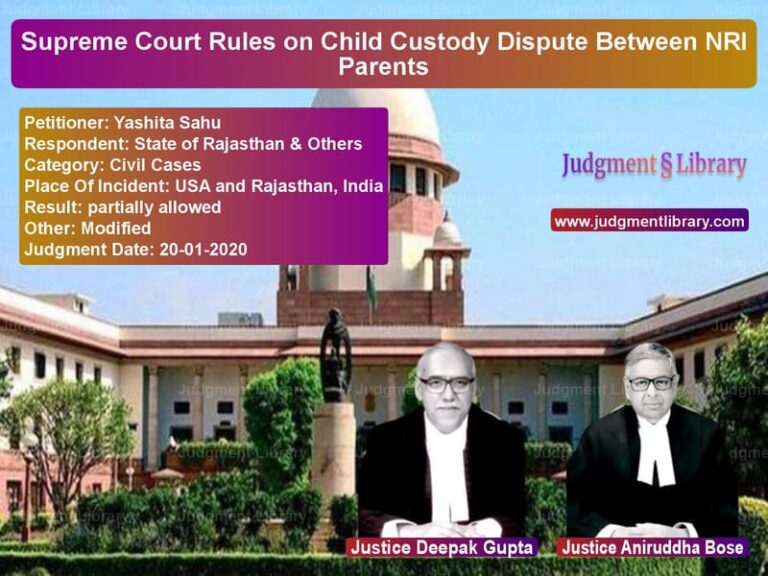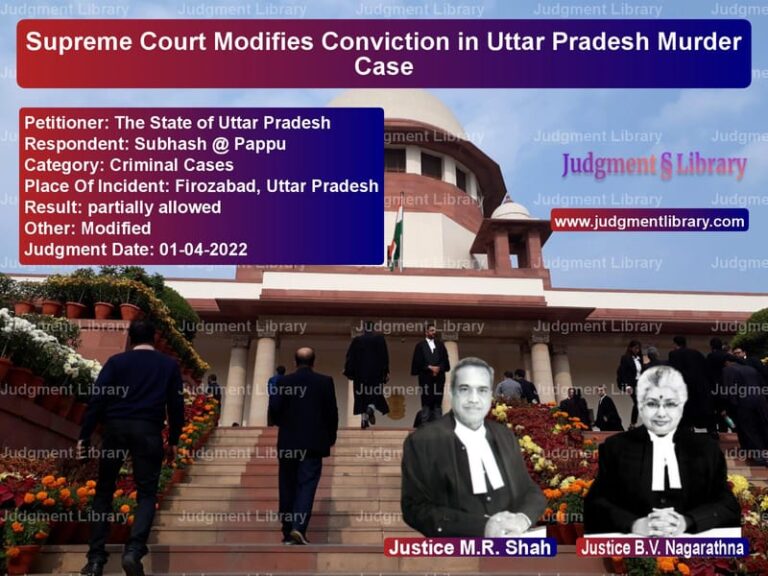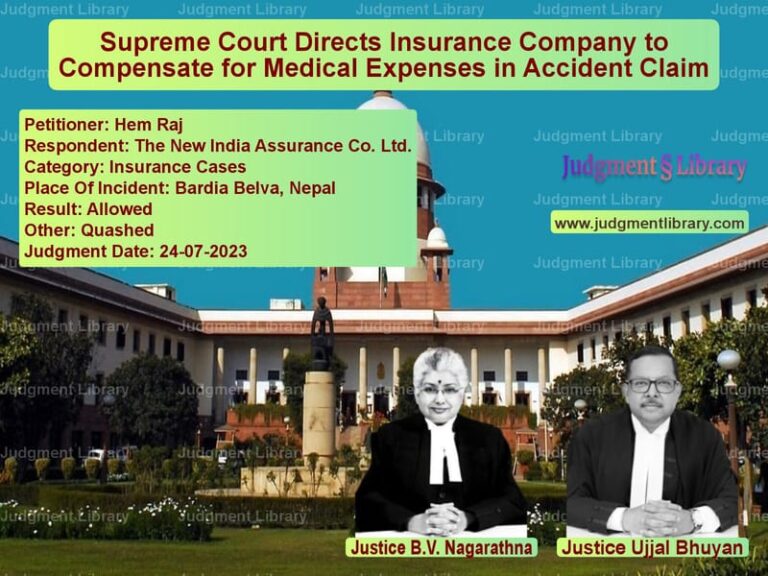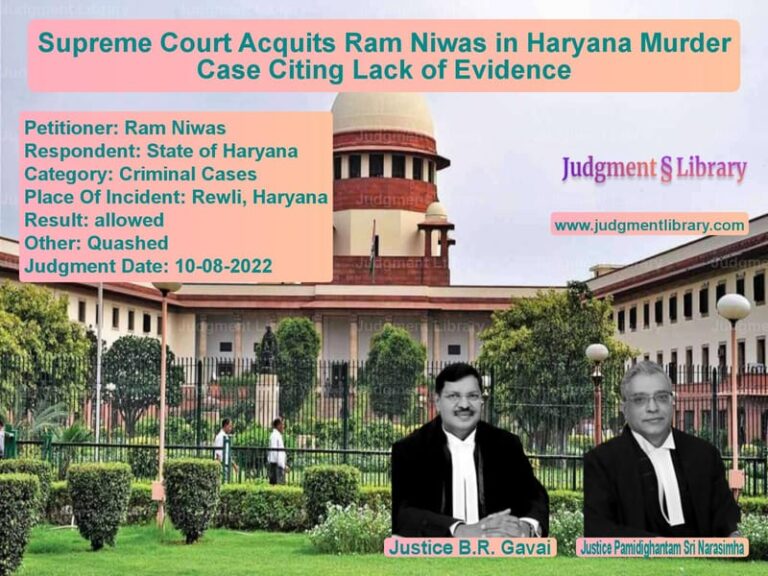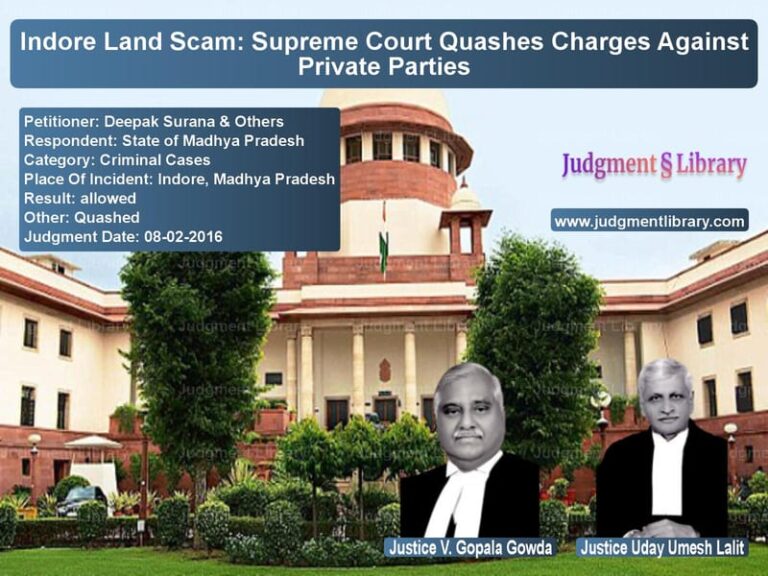Gulam Mustafa vs. State of Karnataka: Supreme Court Quashes Criminal Case in Property Dispute
The case of Sri Gulam Mustafa vs. State of Karnataka & Anr. is a significant Supreme Court ruling addressing the misuse of criminal law in civil property disputes. The case highlights the importance of distinguishing between civil and criminal liability, especially when criminal proceedings are initiated to exert undue pressure on a party involved in a legitimate land dispute.
The dispute arose from a property development project in Bengaluru, where the appellant, Gulam Mustafa, was involved in a Joint Development Agreement (JDA) for constructing residential apartments. A long-standing title dispute over the land resulted in civil suits, which were ultimately decided in favor of the appellant’s company. However, after losing multiple civil cases, the opposing party filed a criminal complaint, leading to an FIR against Mustafa under various sections of the IPC and the SC/ST Act.
Background of the Case
The appellant, Gulam Mustafa, is the Managing Director of GM Infinite Dwelling (India) Private Limited, a company engaged in real estate development. The dispute arose from a project undertaken on land bearing Survey Number 83 in Jodi Mallasandra Village, Bengaluru.
The original landowners entered into a Joint Development Agreement (JDA) with GM Infinite in 2009, and the apartment project was completed by 2017. However, a third party, Venkatesh, who owned land with a similar old survey number, began claiming title over the property. His claims were rejected by multiple revenue authorities and courts.
Despite losing the civil cases, Venkatesh’s relatives filed a criminal complaint, leading to the registration of an FIR against Mustafa and others under Sections 120B, 406, 419, 468, 471, 420, 448, 427 IPC and Section 3(1)(15) of the SC/ST Act.
Arguments Presented
Arguments by the Petitioner (Gulam Mustafa)
- The dispute was purely civil in nature, as it concerned the title to the land.
- Multiple civil proceedings had already been decided in favor of the landowners with whom Mustafa had signed the JDA.
- The FIR was a blatant misuse of the criminal justice system to pressurize the appellant after failing to establish title through civil litigation.
- The complainant’s family had lost their civil suits, and the criminal case was a tool for harassment.
- The SC/ST Act was falsely invoked to give the case a criminal dimension when no caste-based discrimination was involved.
- The courts have consistently held that criminal law should not be used as an alternative to civil remedies.
Arguments by the Respondent (State of Karnataka & Complainant)
- The police investigation should be allowed to continue as the FIR disclosed cognizable offenses.
- The land belonged to the complainant’s family, and forged documents were allegedly used to take possession.
- Sections 420 (cheating), 468 (forgery), and the SC/ST Act were rightly applied as the property belonged to a member of a Scheduled Caste.
- The High Court was correct in refusing to quash the FIR, as police had the authority to investigate.
- The complainant was a member of the SC community and was entitled to protection under the SC/ST Act.
Supreme Court’s Observations
The Supreme Court conducted a detailed examination of the case and made the following key observations:
- “The dispute over land ownership had been conclusively decided in civil proceedings. The criminal case was clearly an abuse of the process of law.”
- The complainant’s family had been unsuccessful in multiple civil cases, and their attempt to initiate criminal proceedings was an afterthought.
- There was an unexplained delay of over 60 years in raising any title dispute, which cast doubt on the complainant’s claims.
- “The invocation of the SC/ST Act in this case was purely to add pressure to a civil dispute. There was no evidence of caste-based discrimination or offense.”
- The High Court erred in refusing to quash the FIR, as the complaint was clearly motivated by malice.
- Criminal cases should not be used as an instrument to settle personal scores after failing in civil litigation.
Final Judgment
The Supreme Court ruled in favor of the appellant and quashed the FIR. The key directives included:
- The criminal complaint and FIR against Mustafa were quashed.
- The High Court’s refusal to quash the FIR was overturned.
- The prosecution under the SC/ST Act was unjustified and set aside.
- The police were directed not to proceed further against Mustafa.
Key Takeaways from the Judgment
- Criminal law should not be used as a substitute for civil litigation: The Court reaffirmed that criminal proceedings cannot be initiated to exert pressure in a civil property dispute.
- Malicious use of the SC/ST Act is impermissible: The Court clarified that merely because the complainant belongs to a Scheduled Caste does not mean the SC/ST Act can be invoked in a non-caste-related dispute.
- High courts must exercise power under Section 482 CrPC judiciously: The ruling reinforced that High Courts should quash criminal cases when it is evident that they are being misused.
- Property disputes should be settled in civil courts: The judgment emphasized that civil litigation must be the forum for resolving land ownership claims.
- Police officers must exercise caution in registering FIRs: The Court warned against mechanically invoking stringent laws without prima facie evidence.
This landmark ruling strengthens the protection against misuse of criminal law and ensures that civil disputes are not converted into criminal cases to harass individuals.
Petitioner Name: Sri Gulam Mustafa.Respondent Name: State of Karnataka & Anr..Judgment By: Justice Dinesh Maheshwari, Justice Ahsanuddin Amanullah.Place Of Incident: Bengaluru, Karnataka.Judgment Date: 10-05-2023.
Don’t miss out on the full details! Download the complete judgment in PDF format below and gain valuable insights instantly!
Download Judgment: sri-gulam-mustafa-vs-state-of-karnataka-&-supreme-court-of-india-judgment-dated-10-05-2023.pdf
Directly Download Judgment: Directly download this Judgment
See all petitions in Bail and Anticipatory Bail
See all petitions in Fraud and Forgery
See all petitions in SC/ST Act Case
See all petitions in Judgment by Dinesh Maheshwari
See all petitions in Judgment by Ahsanuddin Amanullah
See all petitions in allowed
See all petitions in Quashed
See all petitions in supreme court of India judgments May 2023
See all petitions in 2023 judgments
See all posts in Criminal Cases Category
See all allowed petitions in Criminal Cases Category
See all Dismissed petitions in Criminal Cases Category
See all partially allowed petitions in Criminal Cases Category

